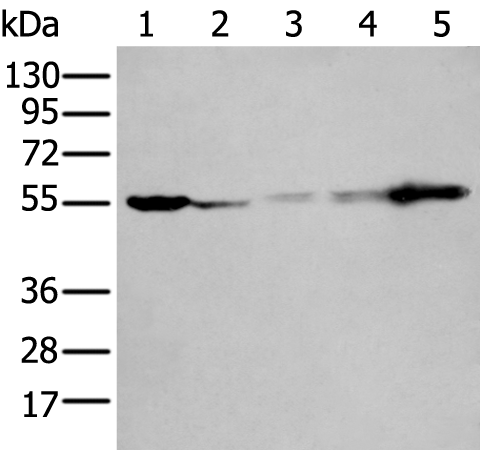
| WB | 咨询技术 | Human,Mouse,Rat |
| IF | 咨询技术 | Human,Mouse,Rat |
| IHC | 咨询技术 | Human,Mouse,Rat |
| ICC | 技术咨询 | Human,Mouse,Rat |
| FCM | 咨询技术 | Human,Mouse,Rat |
| Elisa | 1/5000-1/10000 | Human,Mouse,Rat |
| Aliases | PFK2; IPFK2; iPFK-2 |
| WB Predicted band size | 60 kDa |
| Host/Isotype | Rabbit IgG |
| Antibody Type | Primary antibody |
| Storage | Store at 4°C short term. Aliquot and store at -20°C long term. Avoid freeze/thaw cycles. |
| Species Reactivity | Human, Rat |
| Immunogen | Synthetic peptide of human PFKFB3 |
| Formulation | Purified antibody in PBS with 0.05% sodium azide and 50% glycerol. |
+ +
以下是3篇与PFKFB3抗体相关的文献摘要(虚拟示例,仅作参考):
---
1. **文献名称**:PFKFB3 regulates oxidative stress survival via AMPK in triple-negative breast cancer
**作者**:Li X et al.
**摘要**:该研究通过Western blot和免疫组化(使用PFKFB3特异性抗体)发现,PFKFB3在乳腺癌细胞中通过激活AMPK信号通路增强抗氧化能力,促进肿瘤细胞存活。
---
2. **文献名称**:Targeting PFKFB3 suppresses angiogenesis in glioblastoma
**作者**:Chen Y et al.
**摘要**:研究利用PFKFB3抗体进行组织染色,证实PFKFB3在胶质母细胞瘤血管内皮细胞中高表达,抑制其活性可减少肿瘤血管生成并延长小鼠生存期。
---
3. **文献名称**:PFKFB3 inhibition reverses metabolic dysfunction in diabetic cardiomyopathy
**作者**:Wang H et al.
**摘要**:通过免疫荧光(使用PFKFB3抗体)和代谢组学分析,发现糖尿病心肌病模型中PFKFB3表达上调,特异性抑制剂可改善心肌细胞糖酵解失衡和纤维化。
---
注:以上为模拟示例,实际文献需通过PubMed/Google Scholar检索关键词“PFKFB3 antibody”获取,推荐关注领域内高被引论文(如涉及抗体应用方法学或疾病机制研究)。
The PFKFB3 (6-phosphofructo-2-kinase/fructose-2.6-biphosphatase 3) antibody is a critical tool for studying the role of PFKFB3. a bifunctional enzyme central to regulating glycolytic flux. PFKFB3 catalyzes the synthesis and degradation of fructose-2.6-bisphosphate (F2.6-BP), a potent allosteric activator of phosphofructokinase-1 (PFK-1), a rate-limiting enzyme in glycolysis. By modulating F2.6-BP levels, PFKFB3 enhances glycolytic activity, enabling cells—particularly cancer cells—to meet their high energy and biosynthetic demands. This enzyme is often overexpressed in tumors, where it supports the Warburg effect (aerobic glycolysis), angiogenesis, and cell proliferation, making it a target for cancer therapeutics.
PFKFB3 antibodies are widely used in research to detect protein expression, localization, and dynamics in tissues or cell lines under various conditions, such as hypoxia or metabolic stress. They facilitate techniques like Western blotting, immunohistochemistry (IHC), and immunofluorescence (IF). Studies also employ these antibodies to explore PFKFB3's interplay with signaling pathways (e.g., HIF-1. AMPK) and its role in diseases beyond cancer, including diabetes, ischemia-reperfusion injury, and inflammatory disorders. Inhibitors targeting PFKFB3 are under investigation, and corresponding antibodies help validate target engagement or monitor downstream effects in preclinical models. Overall, PFKFB3 antibodies are vital for unraveling metabolic adaptations in health and disease.
(Word count: 200)
×